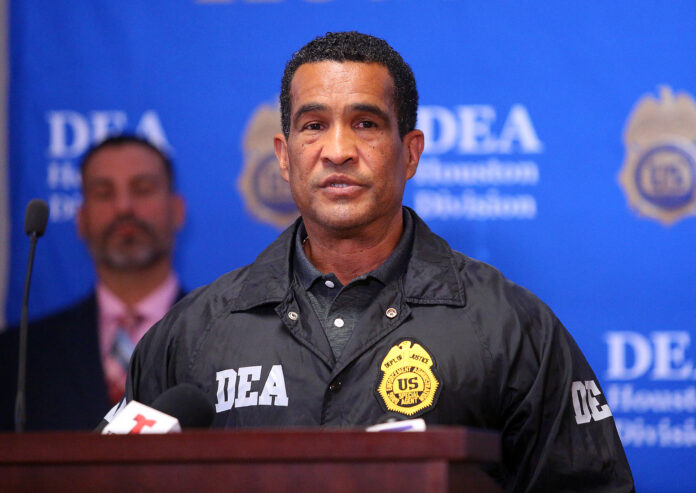
One pill can kill.
That message brought a group of local, state and federal law enforcement together Thursday afternoon on the fourth floor of the McAllen Drug Enforcement Administration building to urge the public to be aware of an epidemic of fake pills circulating throughout the country.
Those pills, which are marketed as legit prescription pills like Xanax or Adderall or Oxycodone, contain methemphatime and fentanyl and can be deadly.

“Even more concerning, the CDC just released preliminary overdose deaths for a 12-month period ending in March. The number of overdose deaths are now 96,700, another record,” said Sammy Parks, a spokesman and special agent with the DEA. “Fake pills containing fentanyl is the primary driver behind these deaths, just like the ones seized in this investigation today and being sold throughout South Texas.”
This group of law enforcement officials, which in addition to the DEA, included the La Villa Police Department, the Hidalgo County District Attorney’s Office, the Edinburg Police Department, the Hidalgo County Sheriff’s Office, and the Hidalgo County Precinct 3 Constable’s Office, said 27 people were arrested Thursday morning across the Rio Grande Valley on state charges related to trafficking fake counterfeit pills containing fentanyl and methamphetamine in addition to various drug offenses.
The Monitor verified 23 of those arrests through public records and determined that 10 of the names included in a DEA news release were individuals arrested Wednesday in Starr County by the DEA, Starr County Sheriff’s Office and Border Patrol on marijuana charges after authorities discovered more than a ton of the drug on a property near Roma.
However, the DEA and partner agencies used the slew of arrests over two days to highlight a public safety alert issued in September. That alert aims to raise public awareness about potentially deadly counterfeit pills in a campaign the agency dubbed, “One Pill Can Kill.”
“This alert was the DEA’s first in over six years,” Parks said.
Houston Division Associate Special Agent in Charge Antonio K. Hubbard spoke on the root of this public awareness effort: the epidemic of overdoses in the United States.
“You hardly hear a response from that now, and I say that’s probably due to the fact that we’re in a pandemic, COVID. We’ve lost 700,000 Americans. That’s why this number of 97,000 Americans dying from an overdose doesn’t really resonate, in my opinion, with the community,” he said. “Every one of those numbers has a family behind it, has a story behind it, has a loved one behind it, a mother, a father, a son, a daughter.”
According to the New York Times, approximately 745,000 people in the U.S. have died in the COVID-19 pandemic.
Hubbard also spoke on the source of fentanyl and meth-laced pills, which is a source that is familiar to residents: cartels in Mexico.
He said those cartels use chemicals sourced by China and those involved do not care about the death and hardship these fake pills inflict across the country as their only aim is making money.
“So if these pills are being produced in some outdoor lab in a bathroom by non-professionals, non-chemists, you are putting yourself in a very dangerous situation by taking these pills and that’s what’s happening,” he said.
According to Hubbard, 50% of pills seized by the DEA contain lethal doses of fentanyl, which equates to the size of 4 or 5 grams of salt.
Hidalgo County District Attorney Ricardo Rodriguez Jr. also touched on the source of these pills, which he described as poison.
“We are close to Mexico, to the border, and we hear and see a lot of things that are crossing over and individuals who are attempting to bring drugs over to our communities that are dangerous to our families and to the kids that we love so much that live here in our community,” Rodriguez said.
According to Juan Sifuentes, the Hidalgo County High Intensity Drug Trafficking Areas task force commander, his collaborative group of law enforcement officers have seized more than 22,000 pills in the last two years, of which, more than 3,000 contained fentanyl.
And Hidalgo County is a gateway for these traffickers to smuggle these pills north, where they end up in cities across the country.
Sifuentes said these drug trafficking organizations use several methods to smuggle pills, including vehicles, body carriers, concealment within commodities and through parcel shipping agencies.
More disturbingly, Sifuentes described the use of children as young as 15 by drug traffickers to further this illicit business of smuggling potentially deadly pills.
“These juveniles were used to smuggle large amounts of pharmaceutical-prescribed controlled substances from Mexico into the United States,” he said.
One of the suspects Sifuentes said was arrested Thursday used juveniles to smuggle pills through ports of entry, with the Progreso port being where the majority of cases where juveniles are being used to smuggle.
Pharmacies in Nuevo Progreso are a popular destination for residents seeking more affordable medication in Mexico, but those pharmacies are also sometimes used by drug traffickers.
And the problem isn’t just juveniles smuggling pills, it’s also juveniles using these drugs, some of which the DEA is warning are not legitimate pharmaceuticals that may contain fentanyl or methemphetamine.
Rodriguez, the district attorney, said juveniles need to be careful because these pills are accessible and when bought from a drug dealer as opposed to a licensed pharmacy, it’s impossible to know what is actually in the pill.
“So my message is to our parents, we have to be careful and vigilant about what our kids are doing and obviously who they are hanging out with and trying to inquire if there’s any drugs at the school and trying to be very vigilant as to what is going on,” Rodriguez said.
Richard Sanchez, DEA assistant special agent in charge of McAllen, shared a similar message.
“It’s important to all the parents that are out there to please, I can’t stress this enough, go into your children’s cellphones, monitor their cellphone activity. Criminal organizations are using social media platforms,” he said. “They are recruiting our children on social media platforms, (like) Snapchat, Facebook Messenger, WhatsApp, Signal. It’s very, very important that you pass that along to your children and that you monitor their accounts.”




